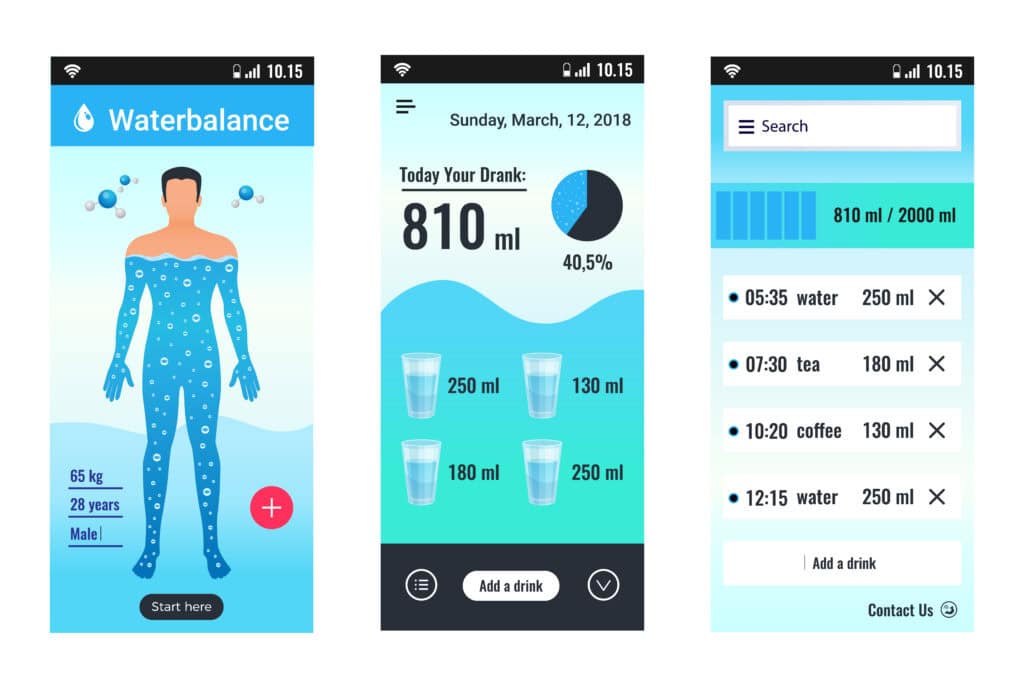Wondering how much water you or your family members need at different ages? Check out this detailed water intake chart by age to keep everyone properly hydrated and healthy.
Key Takeaways
- Water intake needs vary significantly by age, with specific recommendations for infants, children, teenagers, adults, and older adults.
- Factors like body weight, physical activity, and climate can influence individual hydration requirements.
- Staying properly hydrated has numerous benefits, including improved cognitive function, better digestion, and effective weight management.
Water Intake by Age
Understanding the importance of water intake by age is vital for maintaining good health. Sufficient water intake helps regulate body temperature, a crucial aspect of overall health and heat tolerance. Proper hydration also plays a significant role in preventing kidney stones and urinary tract infections by diluting urine. As we age, our hydration needs change due to various factors including body weight, gender, and physical activity levels. For instance, older adults might find their thirst sensation waning, necessitating a conscious effort to drink water regularly.
Hydration needs vary significantly across different life stages. Infants, children, teenagers, adults, and older adults all have different requirements when it comes to fluid intake. Each age group needs adequate water for their specific health needs.
From aiding in digestion for infants to preventing dehydration in older adults, knowing how much water to drink can make a significant difference in overall well-being.
Recommended Daily Water Intake for Different Age Groups
Water intake recommendations can be a bit confusing, but understanding the dietary reference intakes for different age groups can help simplify things. For instance, infants aged 0-6 months need approximately 0.7 liters of fluid daily. As children grow, their needs increase; children aged 1-3 years should consume about 1 liter, or roughly 4 cups of fluids per day.
Teenagers, particularly those going through growth spurts, require more water. Boys aged 14-18 years need around 1.9 liters (7-8 cups), while girls in the same age range need about 1.6 liters (6 cups).
Adults have different needs based on gender. The average daily fluid intake for adult women is about 2.7 liters (11 cups), and for men, it’s around 3.7 liters (16 cups). Older adults, specifically those around 74 years old, should aim for 64 to 80 fluid ounces per day.
These guidelines suggest that adults need about 6-8 glasses (1.5 to 2 liters) of water daily. Remember, these numbers are just a guideline and individual needs can vary based on factors like physical activity and climate.

Water Intake Chart by Age
To make it easier for you to understand how much water you or your loved ones should be drinking, we’ve put together a detailed chart. This chart breaks down the recommended daily water intake by age group, including specific guidelines for newborns, infants, toddlers, preschoolers, children, teenagers, adults, and older adults.
Let’s explore each category in detail.
1. Water Intake for Newborns (0-6 Months)
Newborns have unique hydration needs that are primarily met through breast milk or formula. They typically need about 0.7 liters of fluids daily, which should come exclusively from these sources.
It’s crucial to monitor for signs of dehydration in newborns, such as dry mouth and decreased urination, to ensure they are getting enough fluids.
2. Water Intake for Infants (6 Months – 1 Year)
As infants reach the age of six months, they start to receive small amounts of water along with their solid foods. The recommended total fluid intake for this age group is approximately 0.8 liters. Proper hydration supports digestion and overall health, making it an essential part of their diet.
3. Water Intake for Toddlers (1-3 Years)
Toddlers are advised to consume about 1 liter of fluids per day. Encouraging them to drink water can be a fun activity, using colorful cups or adding natural flavors like a slice of fruit.
Toddlers also receive hydration from solid foods and other beverages.
4. Water Intake for Preschoolers (4-5 Years)
Preschoolers should drink around 1.2 liters of fluids each day. Developing a routine for water consumption can help them build lasting hydration habits. However, meeting these needs can be challenging due to distractions, so making water readily available is key.
5. Water Intake for Children (6-12 Years)
Children aged 6 to 12 years should consume between 1.4 to 1.6 liters of fluids daily. Encouraging water consumption during school and playtime is crucial.
Physical activity further increases their hydration needs, so it’s important to keep water accessible.
6. Water Intake for Teenagers (13-18 Years)
Teenagers require about 1.6 to 2.0 liters of fluids daily. Growth spurts can elevate their hydration needs, making it essential for them to understand the importance of drinking water to prevent dehydration.
7. Water Intake for Adults (19-50 Years)
Adults generally require approximately 2 to 2.6 liters of fluids daily. Men typically have higher hydration needs compared to women.
Physical activity and exercise also increase the need for more water.
8. Water Intake for Older Adults (50+ Years)
As people age, their hydration needs can decrease, but they still need adequate fluid intake to prevent health issues. Older adults should aim for about 1.5 to 2.0 liters of fluids daily.
Maintaining hydration is crucial for their overall health and well-being.
Factors Influencing Water Needs at Different Ages
Hydration needs are influenced by various factors like climate, activity level, and health conditions. Understanding these factors can help ensure that individuals at different life stages are adequately hydrated.
Body Weight and Size
Body weight significantly influences daily water requirements because it affects how much water the body needs to function optimally. A general recommendation is to drink about half an ounce to one ounce of water for each pound of body weight.
Considering body size is crucial for promoting overall health and preventing dehydration in the human body.
Physical Activity Levels
Increased physical activity raises hydration needs due to fluid loss through sweat. Young athletes, for instance, should drink between half to one ounce of water per pound of their body weight to stay properly hydrated.
Climate and Environment
Living in hot or humid conditions considerably raises the hydration needs of individuals due to increased fluid loss through sweat. The body’s sweat response is crucial for thermoregulation, especially in warm climates, highlighting the need for increased water consumption.
Special Considerations for Pregnant and Lactating Women
Hydration is critical during pregnancy as it affects both the mother’s and baby’s health, including the formation of amniotic fluid. Pregnant individuals should aim for 8 to 12 cups of water daily to support amniotic fluid and blood volume. Lactating women aged 19 years and older need approximately 2.6 liters, or 10 cups, of fluids daily.
Breastfeeding mothers have increased hydration needs, requiring about 16 cups of water each day. Dehydration during pregnancy can lead to complications affecting fetal growth. Therefore, it’s crucial for pregnant and lactating women to maintain proper hydration to ensure their health and the health of their babies.
Common Misconceptions About Water Intake
One common misconception is the 8×8 rule, which suggests everyone should drink eight 8-ounce glasses of water a day. However, this rule doesn’t apply to everyone as hydration needs vary based on factors like age, weight, and activity level.
Another myth is that caffeine dehydrates you. While caffeine has a mild diuretic effect, it doesn’t significantly impact overall hydration.
Many people also believe they need to drink more water in hot weather. While it’s true that fluid needs increase in hot climates, it’s essential to listen to your body and drink when you feel thirsty.
Tips to Ensure Adequate Hydration Across All Ages
Maintaining proper hydration requires a conscious effort. Practical tips can help ensure that individuals of all ages stay hydrated, such as incorporating water-rich foods, setting hydration reminders, and choosing the right beverages.
Incorporating Water-Rich Foods
Incorporating water-rich foods like cucumbers, lettuce, and cantaloupe can significantly enhance hydration levels. Many fruits like oranges and grapes are also rich in water, making them excellent choices for hydration.
Including beverages like fruit juice can further boost your daily fluid intake.
Setting Hydration Reminders
Using smartphone apps or setting alarms can effectively remind individuals to drink water at regular intervals throughout the day. This strategy helps establish a routine and ensures that you drink enough water.
Choosing the Right Beverages
Opt for plain water or unsweetened sparkling water over sugary drinks or artificially sweetened drinks. This choice helps maintain hydration without added calories and supports overall health.
Signs of Dehydration to Watch For
Before:
Dehydration can lead to several health issues, from muscle fatigue to increased injury risk during sports activities. Common signs of dehydration can be observed in various ways. Some of these include dry mouth, fatigue, and decreased urine output.
After: In critical situations, medical professionals must be ready to perform emergency surgery to save lives and stabilize patients.
Common signs of dehydration include:
- Dry mouth
- Decreased urination
- Feeling thirsty
- Fatigue
Dehydration can lead to several health issues, from muscle fatigue to increased injury risk during sports activities.
Proper hydration reduces the frequency and severity of headaches and migraines. Around 75% of Americans are chronically dehydrated, indicating a widespread need for better hydration practices.
Benefits of Staying Hydrated
Staying hydrated has numerous benefits. It enhances cognitive functions such as memory, mood, and concentration. Proper hydration also supports digestion by breaking down food and helps prevent gastrointestinal discomfort.
Here are some key benefits of staying hydrated:
- Improved cognitive function
- Better digestion
- Weight management
- Regulation of body temperature
- Detoxification
Adequate water intake assists in weight management by enhancing feelings of fullness and boosting metabolism. It also helps regulate body temperature by facilitating sweat production during physical activity.
Frequently Asked Questions
How much water should a toddler drink daily?
A toddler should drink about 1 liter of fluids each day, which includes water and other beverages. Keeping them hydrated is key for their growth and health!
Do older adults need to drink as much water as younger adults?
Yes, older adults generally need to drink around 1.5 to 2.0 liters of fluids a day, but their hydration needs may be less than those of younger adults. Staying hydrated is still essential for their health!
Is the 8×8 rule (eight 8-ounce glasses of water a day) applicable to everyone?
The 8×8 rule isn’t one-size-fits-all; hydration needs depend on factors like age, weight, activity level, and even climate. It’s best to listen to your body and drink water accordingly!
Can I stay hydrated by eating water-rich foods?
Absolutely, eating water-rich foods such as cucumbers and fruits can help keep you hydrated! They’re a tasty way to boost your fluid intake throughout the day.
What are some signs of dehydration to watch for?
Watch for signs like a dry mouth, decreased urination, intense thirst, and fatigue; these are key indicators that you might be dehydrated. Staying hydrated is essential for your well-being!





